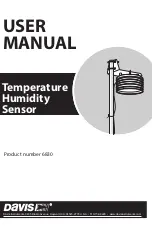
PROFIBUS
CX8030 / CX8031
79
Version: 1.6
operating parameter. If this parameter is set to
True
, then the DPM1 switches the outputs of all the
associated DP slaves into a safe state as soon as one DP slave is no longer ready for the transfer of user
data. The DPM1 then switches into the Clear state. If the parameter is
False
then the DPM1 remains in the
operating state even after a fault, and the user can himself specify the system's reaction.
Data traffic between the DPM1 and the DP slaves
The data traffic between the DPM1 and the DP slaves that have been assigned to it is automatically
executed by the DPM1 in a specified, continuously repeated sequence. The user specifies the assignment of
a DP slave to the DPM1 when the bus system's project is being planned. Those DP slaves that are included
in or excluded from the cyclic user data traffic are also defined.
The data traffic between the DPM1 and the DP slaves is divided into the parameterization, configuration and
data transfer phases.
Before a DP slave is included in the data transfer phase, the DPM1 checks, in the parameterization and
configuration phase, whether the theoretical configuration that has been planned agrees with the actual
configuration of devices. The check requires the device type, the format and length information, as well as
the number of inputs and outputs, to be in agreement. The user is thus provided with reliable protection
against errors in parameterization. In addition to the transfer of user data, which is automatically carried out
by the DPM1, it is possible to send new parameterization data to the DP slaves at the user's request.
Protection mechanisms
In the context of distributed peripherals it is necessary, for reasons of safety and reliability, for the system to
be given extremely effective functions to protect against incorrect parameterization or the failure of the
transmission mechanisms. PROFIBUS DP uses monitoring mechanisms in the DP Master and in the DP
Slaves. They are implemented in the form of time monitors. The monitoring interval is specified in when the
DP system project is planned.
Protection mechanisms
Description
At the DP Master
The DPM1 monitors the slave's transfer of user data
with the Data_Control_Timer. An individual
monitoring timer is used for each assigned slave. The
time monitor triggers if a proper transfer of user data
does not take place within the monitoring interval. In
this case the user is informed. If automatic error
reaction is enabled (Auto_Clear = True) then the
DPM1 leaves the
Operate
state, switches the outputs
of the assigned slaves into a safe state, and then
goes into the
Clear
operating mode.
At the DP Slave
The slave uses communication monitoring in order to
detect errors of the master or in the transmission
segment. If data is not transferred with the assigned
master within the communication monitoring interval
the slave switches the outputs into the safe state
itself. The slave inputs and outputs further require
access protection in multi-master systems, to ensure
that direct access is only made from the authorized
master. The slaves will make an image of the inputs
and outputs available to other masters, and this can
be read by any other master even if it does not have
access authorization.
Ident number
Every DP slave and every DPM1 must have an individual identification number. This is required so that a DP
master can identify the types of the connected devices without any significant protocol overhead. The master
compares the identification numbers of the connected DP devices with the identification numbers in the
project planning data specified by DPM2. The transfer of user data only starts if the correct device types are
connected to the bus at the correct station addresses. This provides protection from project planning errors.
Manufacturer-specific identification numbers are issued by the PROFIBUS User Organization (PNO). The
PNO administers the identification numbers along with the basic device data (GSD).
















































